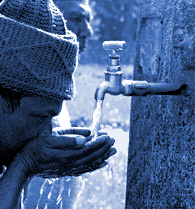Locals in fight to fix world's water worries
 The first ever WorldSkills Water Innovation Challenge has mixed technophile and tradie to produce sanitation solutions for the world’s poorest regions.
The first ever WorldSkills Water Innovation Challenge has mixed technophile and tradie to produce sanitation solutions for the world’s poorest regions.
An Australian team took part in the competition to create innovative clean water and sewerage systems for Nepal and Bangladesh.
RMIT science, media, engineering, design and plumbing students came together for the challenge, demonstrating practical and academic skills in their knowledge of land, windmill and solar pump systems.
"During the competition, outcomes required team skill combinations so that engineers were working with plumbers on practical tasks and on computer designs and presentations," RMIT student Nurul Driver said.
It was Australia versus the US in a three-round humanitarian show-down.
The first challenge required the teams to design and document water solutions for community problems in a village in northern Bangladesh.
The second challenge was to design and document solutions for community problems in Nepal.
And the final challenge involved hands-on practical tasks including assembling a hand bore pump, a rainwater collection system and a solar pump installation.
With their newly-assembled pumps, the teams raced each other each to fill a 100-litre tank.
A side challenge saw teams asked to compile user-friendly installation and maintenance manuals that could go above language barriers.
RMIT Project Leader Dr Helen Smith says the competition exemplified one of the most important elements of modern science – mixing disciplines to generate more effective results.
“This global challenge fostered an appreciation of... how trades work with RMIT researchers to add value to cutting-edge research that results in innovative solutions to global problem,” she said.
The RMIT team used recent research on the use of aquatic plants to demonstrate an environmentally sustainable and technically manageable solution for waste disposal in small communities.
Unfortunately the local team lost out to a squad from the US, whose winning concept will be further developed and implemented in Bangladesh in 2015.
Both teams will travel to Bangladesh next year to jointly implement the winning solution.








 Print
Print